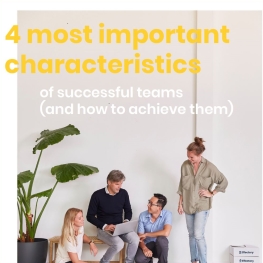Some time ago, I was asked to facilitate a few trainings at an organization. Together with the HR business partner I had discussed that I would train the managers to ‘have a good conversation’ with their direct reports. This approach had emerged after employee research showed this was a challenge the organization struggled with.
The secret of successful organizational change

Normally these trainings consist of theory, practicing some tools, and finally an intervention session. I had agreed upon an approach with the HR manager beforehand, but none of the five scheduled trainings went as planned. Already during the introduction round, the managers started expressing their frustration about the organization.
A listening ear
This appeared to be a pattern. The managers introduced themselves with “Hi, I’m John; I have been working here for 32 years and *starts to rail against the organization*”. Henry, Natasha and Patrick all did the exactly the same. It was remarkable: the frustration was that high that it was already voiced in the introduction round in such a blatant way.
Normally I use the introduction round to get an impression of how everyone feels and how they value the training. During the first session I tried to stick to the agreed framework, but nothing seemed to work out and I had to let go of the complete structure of this session. I realized that the participants needed something completely different than the suggested methods. This was a listening ear.
It appeared to me that this training gave the managers, based all over the Netherlands, the opportunity to finally share their frustrations with one another. During these four hours they found acknowledgement in telling and listening to stories. By chance this happened at all the five trainings and it was obvious that the valve needed to be opened for the managers to vent their frustration before we could move on to a next step. Ignoring this would lead to resistance or worse.
How HR can lead business success
HR and employee listening are crucial to business success. Here is how employee insights can help your organization.
DownloadLife events
In line with these moments of frustration I experienced while facilitating the training, I have seen a strong resemblance between many situations and the human life cycle during my work in organizations. An organization has a history with positive and negative life events, for example, the birth of the organization, financial problems or growth; divorce, loss of loved ones, the addition of a new family member, health problems, or growing pains. During the sessions mentioned before I noticed many situations that resembled old grudges. Many of these problems could have been avoided.
These old grudges frequently have to do with moments of change. Change means losing something: something of what was before. Everyone deals with that differently. But more importantly, change can mean a new beginning. Just like in life, you can perceive change as a new challenge or opportunity, an exciting situation steeped in uncertainty.
The four secrets of successful teams
Are you working on making your teams perform better and more autonomously? Then download our whitepaper below: The four secrets of successful teams.
The 4 characteristics of successful teams
This useful guide provides the foundation for building effective and successful teams. Download your copy for practical guidelines.
DownloadThe transition model
Recently I did a course where I learned William Bridges’ model: the transition Model. This model really inspired me. His book Bridges (2003) states that it is not the changes that trouble us, but the transitions. He argues that change is situational: a new director, a change of roles within an organization or team move to a new location. By contrast, transition is psychological and can be divided into three phases of internalizing and accepting the process of change.
- Closure, letting go and losing: This is about saying goodbye to old ways of working and identity. This means the employees need to be guided through handling the loss.
- Neutral zone: Employees need to go through a period in which the old has been let go of and the new has not yet been implemented. This is a moment of essential psychological adaption.
- New beginning: This is about closing the transition period and starting anew. In this phase people develop a new identity to adapt to the change. They start to feel a new energy and find meaning in the situation that has just come into existence. These three developments, new identity, energy and meaning, ensure that the new change will be successful.
These three phases have striking similarities to the mourning process that we as humans go through. Think of a situation in which you went through a period of change: a relationship that ended, a newborn child, a new house; a period in which you went through a burnout or the loss of a loved one. Do you recognize the phases above?
Guidance through transition
In the 32 years John had worked at the organization he had gone through a lot. I particularly felt that he had not been able to process the traumas of the reorganizations he had gone through. This was equally true for Henry, Natasha and Patrick and the others in the trainings. These specific cases show that there has been many transitions in the organization and very little adequate guidance alongside them. For an organizational change to be successful, it is of utmost importance to provide the employees with guidance.
In the individual cases I was confronted with during the five trainings, it was very clear that they had accumulated the pain of past experiences and they had not had the chance to mourn and process it. It had not been acknowledged by the organization. This guidance can take the form of someone that asks you ‘How are you?’, ‘What does this mean to you?’ or ‘What impact does this change have on you?’.
It’s just like in real life, where everyone needs a friend or family member that asks you those questions, because they care, and you need to feel that they care and acknowledge your efforts.
Team coaching
Do you recognize the situations from the story above? If you want your organization to be able to provide adequate guidance with the transitions any successful organization must go through, get in touch with us! We would really like to support you with a team coaching process.
Book a free demo. See our solutions in action.
Effectory is Europe’s Leading provider of Employee Listening Solutions. Schedule a product demo and discover how to enhance your employees’ engagement.
Demo request

